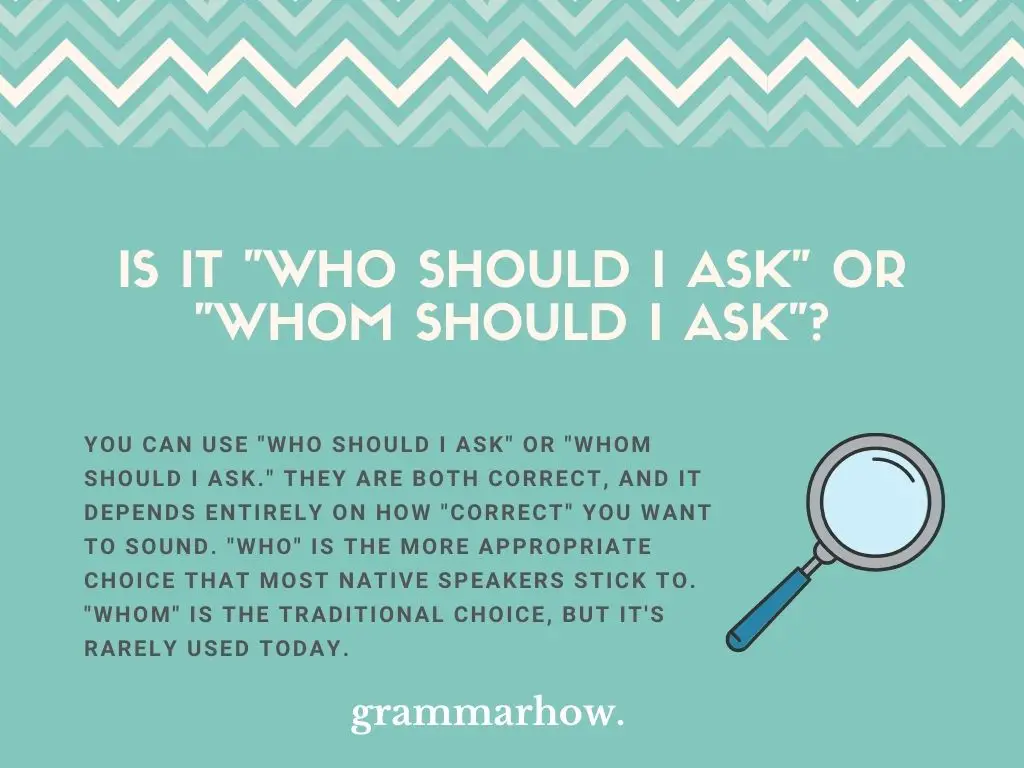If you want to make sure you’re using “who” and “whom” correctly, you’ve come to the right place. This article will explain how “who” and “whom” work in the question “who should I ask.”
Is It “Who Should I Ask” or “Whom Should I Ask”?
You can use “who should I ask” or “whom should I ask.” They are both correct, and it depends entirely on how “correct” you want to sound. “Who” is the more appropriate choice that most native speakers stick to. “Whom” is the traditional choice, but it’s rarely used today.

You can use these phrases interchangeably, but we recommend you pick one and stick to it. “Whom” typically only works in the most formal situations, but “who” works both formally and informally.
We use “whom” as the object in the sentence, which is why it is technically correct. After all, “I” is the subject, and it’s appropriate to have an object and a subject present in a grammatical sentence.
“Who” can also be used as an object today, though. While it didn’t originally come with this meaning, it’s become much easier for most native speakers to use this form when asking questions like this.
If you’re a bit stuck as to which is more appropriate, stick to “who.” “Who” works in way more situations than “whom,” so it’s going to be your best friend when it comes to writing these forms.
According to Google Ngram Viewer, “who should I ask” is by far the most popular choice, and it’s only getting more popular as the years go by.

Who Should I Ask
“Who should I ask” is the best way to phrase this question. You should use it because “who” is more comfortable to native speakers than “whom.” Often, a native speaker will think you’re trying to sound too “correct” when using “whom,” which is why it’s not smart to do so.
Most native speakers find that “whom” is only used by grammar elitists. It’s only used when someone wants to show off that they have a “better” understanding of grammar rules than you.
Since this is the case, “whom” comes with a lot of stigma behind it. That’s part of the reason why so many people have dropped it from their vocabulary as time goes by.
- Who should I ask for help? Is there anybody on this list that might be able to give me what I’m looking for?
- I’m not sure, so who should I ask? Do you have any ideas as to who might be the best option?
- Wait, who should I ask again? Is there anyone here that might be more useful to me?
- Who should I ask? I feel like I’ve already checked in with you before, but I didn’t get an answer back then!
Whom Should I Ask
“Whom should I ask” is grammatically correct, and it follows all the traditional rules associated with objects and subjects in sentences. It’s not commonly used because most native speakers avoid using “whom.” It’s a very jarring word that sounds overly pretentious in most cases.
“Whom” is usually avoided in most situations. The only time it is applied is in the most formal situations that demand the best grammar rules or when the preposition comes directly before it.
In any other case, you’ll be better off using the more natural “who.” Still, it is correct to use “whom,” and this is how it works:
- Whom should I ask to get to the bottom of this? I want to make sure that I get the best help possible for all of it.
- Whom should I ask, though? Is there anyone out there that has the know-how to make sure I get this right?
- I want you to tell me, whom should I ask? I feel like you’re keeping that information away from me, and I don’t like that.
- Whom should I ask? Do you have any ideas as to who might offer the most help when it comes to all of this?
Final Thoughts
It’s possible to use both “who should I ask” and “whom should I ask.” However, most native speakers stick to using “who” because it’s more natural and familiar. “Whom” is a dying word, and it’s one that likely won’t be around for a long time as English continues to evolve.
You may also like:
Is It “Who Do You Work For” or “Whom Do You Work For”?
Is It “Most Of Which” Or “Most Of Whom”? (Correct Version)
Some Of Whom Or Some Of Who? Here’s The Correct Version (+8 Examples)

Martin holds a Master’s degree in Finance and International Business. He has six years of experience in professional communication with clients, executives, and colleagues. Furthermore, he has teaching experience from Aarhus University. Martin has been featured as an expert in communication and teaching on Forbes and Shopify. Read more about Martin here.

